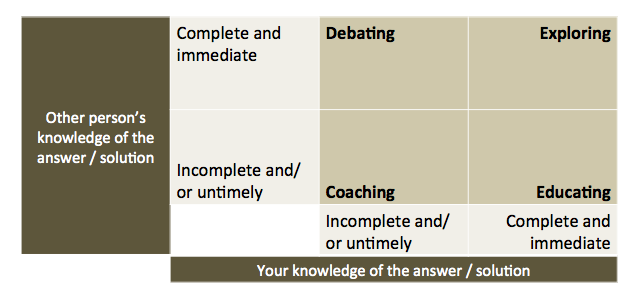I often hear people saying they are coaching others in an agile context. Coaching is often incorrectly used to mean: consulting, teaching, mentoring and a few other unexpected meanings.
Coaching is very useful to help people get from “point A to point B” and it can be used in various contexts, including coaching for Agile adoption or to help people managers modify their leadership style. Either way, to be powerful, coaching requires a few basic skills and a question from my friend Yves prompted me to describe 12 fundamental elements that I believe are required to be an effective coach. You are more than welcome to share your thoughts.
- Inner silence: To be truly effective at listening to what others are saying and how they are feeling, it is critical to block the voice inside your head – yes that’s right, that voice that rambles all the time saying things such as: I wonder what we’ll eat for dinner tonight?… Damn, I forgot to make reservation for dinner… I hope the kids did well on their math test today… I’m bored… I think I want a coffee right now. I heard the term monkey brain to describe this constant action of jumping around from one thought to the next. To be an effective coach, you will need your monkey brain to calm down so you can find inner peace.
- Stop all judgment: When you coach people, it is easy and unproductive to become judgmental. Comments such as: Wow, that’s a weird comment… I wonder why he’s saying this… There must be some secret meaning to that sentence… I don’t think I’l be able to help her on this topic… I feel insecure… This won’t help be effective at all. Simply listen to what is being said for what it is being said. Judgments will sidetrack your listening abilities and will make you a very poor coach.
- Stay focused: Now that you stopped all judgements and are able to keep the inner voice quiet, you need to remain focused for more than 6 seconds. Yes, just like meditation, this sounds like an impossible task at first but with practice, you will develop your focusing-muscle and the task will get easier with time allowing you to be more present to what the other person is expressing.
- Be present: Be in the moment – right there and then. Listen to what is being said, notice how the person is acting and give her your full attention and make the space secure for the conversation.
- Don’t aim for personal performance: Aiming for an academy award when you are coaching simply doesn’t work. You are not there to impress anyone. Ironically, the more you will try to impress the other person, the less effective you will be. She will will quickly notice that the focus is on you and not her which will make it pretty much impossible to actually support her development.
- Ask open ended questions and wait for the answers: Remember, you are not telling a story, you are there to listen. If you need clarification or want to encourage discussion, simply ask a short question. Trust yourself that the other person will understand your questions and if they don’t, they will quickly let you know. Once you have asked your question, wait for the answer.
- Trust your intuition: If you feel that you need to ask a certain question, then go ahead and ask it. If you believe it is better to wait, then wait. I believe what we call intuition is simply our brain and senses’ abilities to decipher subtle messages from the other person and give us clues as how to interact with them.
- Keep silent: After asking a question, never speak first. Maintain the silence until the other person breaks it. I am a very strong believer in keeping silent. Silence opens up a secure space for conversations and gives all the space to the other person.
- Pay attention to the non-verbal: Words are a great way to communicate but non-verbal clues are usually very useful to understand where the person stands – Are they at a rational level? Intuition level? Emotional level? This information will be very useful to adapt your coaching style.
- Dig deep: It is much easier to stay at the rational level in a discussion. It often leads to contextual information and detailed explanations. To make a real difference, you need to get to the underlying emotions – What are the person’s fears? Intentions? Motivations? Ask feeling-related questions, not logical or rational questions such as: “How do you feel about this event?” instead of “What do you think about this?”.
- Rephrasing: When rephrasing, use the same key words as the other person. The words are usually very meaningful to the other person and will open up relevant information for you.
- No context: Do not focus too much on the context. It is usually good to understand what triggered the actions or where the event took place, but the information usually has very little impact on the person you are coaching.
Are there other tips you would like to share?


Recent Comments